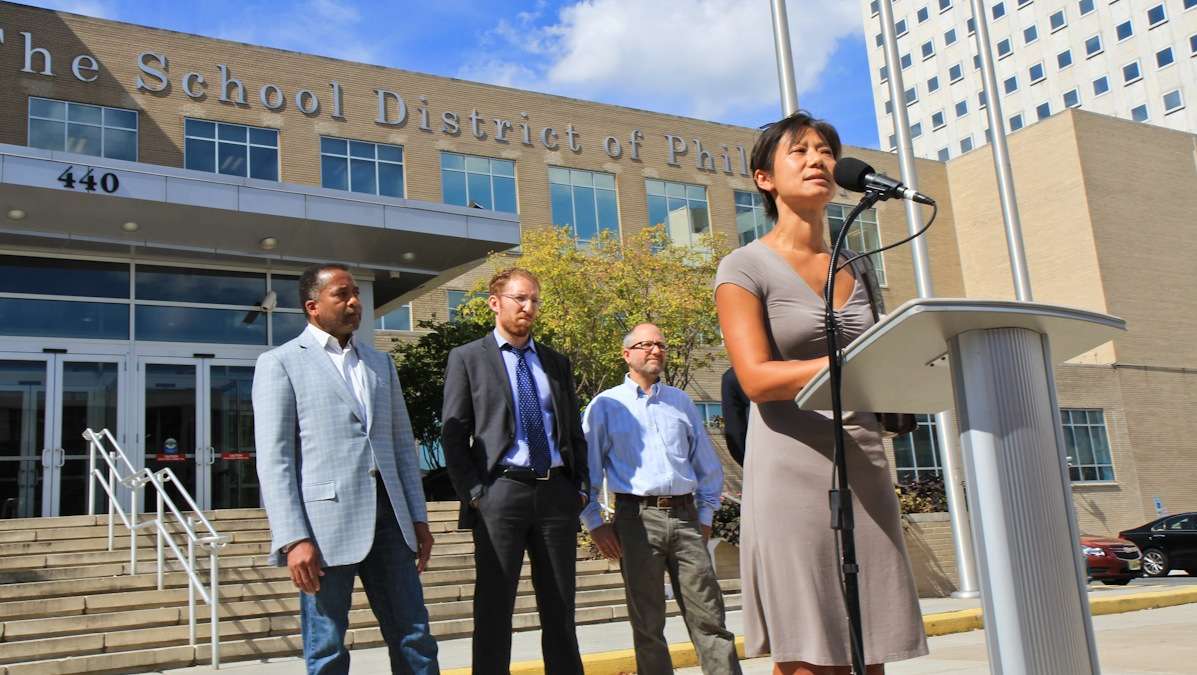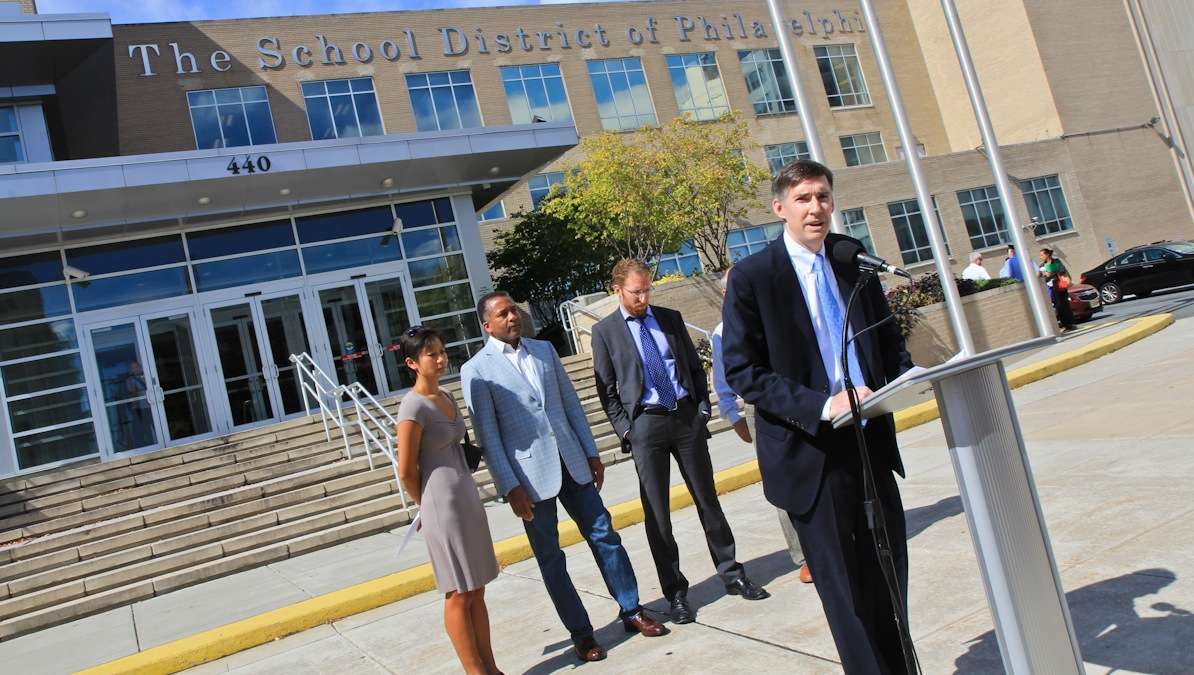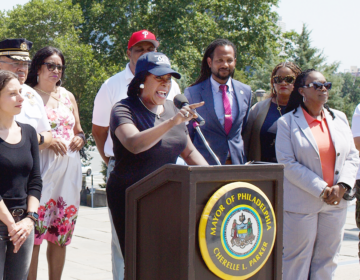Activists call on Philly schools to limit teacher seniority, unilaterally
It’s been called the “nuclear” option.
On Monday afternoon a coalition of education groups called on the Philadelphia School District to bypass negotiations and unilaterally impose new contract terms on the district’s teachers.
The groups, led by Philadelphia School Partnership and PennCAN, specifically want the district to do away with teachers’ union seniority provisions that give teachers with more years of experience their preference among available positions.
Instead, these advocates say the district should implement a system of 100 percent “mutual consent,” where principals and prospective teachers agree on every new placement. This system — referred to within the district as “site selection” — is already in place in 169 of the district’s 212 schools.
In 2012-13, nearly half of 1,047 open full-time positions were filled through the site selection process, the rest by traditional seniority procedures.
Reformers say the status quo prevents principals from building school teams that believe in the principal’s approach.
The Philadelphia Federation of Teachers strongly opposes eliminating seniority as a factor in placement.
A 1st-grade ‘travesty’
Nina Liou, parent of a kindergartner and second grader at Bache-Martin Elementary in Fairmount (where she’s also Home and School Association president), was there to advocate for the change.
She said, in recent years, one of the school’s first-grade teachers was laid off and eventually replaced by someone with more seniority — a district employee who had been working as an administrator at district headquarters. Liou claimed the person came back into the classroom after a 10-year absence in order to ensure full retirement benefits.
Liou called the year a “travesty” for the students.
“The ground that these first-grade students in her classroom lost and the lack of the educational progress that they had as a result was unconscionable” said Liou, “and is something that no child or family in the district should ever have to encounter.”
Jonathan Cetel, executive director of Pennsylvania Campaign for Achievement Now (PennCAN), agrees.
“This year, in schools all over the city, teachers with higher seniority have been able to ‘bump out’ less experienced teachers as a result of school closings and budget cuts,” Cetel said. “In some cases, the teacher being bumped is the better teacher — perhaps even one of the district’s best teachers.”
Mark Gleason, Philadelphia Schools Partnership executive director, said the time to make this reform was overdue, and hoped the district would make the change before it began “leveling” – the process by which teachers are shuffled around the district to compensate for unexpected spikes in student enrollement.
“We’re a month past the expiration of the contract, we’re a month into the school year,” he said, “and it’s time for management to use the authority and responsibility it has.”
Gleason and others believe the School Reform Commission has the power to impose this work-rule change based on Act 46 of the Pennsylvania state school code — the same law that, in 2001, eliminated Philadelphia’s local school board and placed the district in the hands of the five-member SRC, with three members appointed in Harrisburg and two by the mayor.
They point specifically to the provision of Act 46 which says that “no distressed school district of the first class,” (Philadelphia is the state’s only city “of the first class”) “shall be required to engage in collective bargaining negotiations …” regarding “staffing patterns and assignments, class schedules, academic calendar, places of instruction, pupil assessment and teacher preparation time.”
If “mutual consent” were made official district policy, PSP and PennCAN believe that change would induce the state to release the $45 million it has been withholding from the district – waiting for it to adopt a “reform agenda.”
They think the change will also give state legislators the greater “confidence” they need to invest additional funding into Philadelphia’s schools.
“It’s hard to make that argument for more money when there’s still broken parts of the system,” said Cetel of PennCAN.
Legal?
Some, though, dispute the notion that the SRC actually has the power to unilaterally impose new contract terms.
In an interview in August, Superintendent William Hite — who supports eliminating existing seniority provisions — said about unilateral contract terms, “I’m not even sure that’s a true statement that that power is even available.”
The actions of SRC Chairman Pedro Ramos suggests he agrees with Hite’s assessment that the law is fuzzy.
In 2012, he lobbied the state to specifically delineate that power.
Appealing to Republicans in the state legislature, Ramos said Act 46, as written, didn’t give the SRC “enough juice.”
According to the Inquirer, Ramos wanted an amendment that would specifically give the SRC the power to nullify union contracts and unilaterally dictate salary and benefits to School District employees.
When Philadelphia’s state delegation found out about Ramos’ request, the proposed amendment died without getting through committee.
Pushback
Philadelphia Federation of Teachers President Jerry Jordan defended the seniority system. In a written statement, he said that “the seniority provisions in the school code were implemented to protect school employees from the atmosphere of patronage clearly favored by PSP and PennCAN.”
“The bottom line is this,” Jordan wrote. “When our schools are properly funded, children and educators have the tools they need to improve teaching and learning. That is why we don’t often hear about debates over teacher seniority in better-funded school districts.”
Hiram Rivera, executive director of Philadelphia Student Union, called the reformers’ pitch “a ploy to blame the teachers’ union for the [current funding] crisis.”
“What teacher seniority has to do with a funding crisis,” said Rivera, “I don’t know.”
District spokesman Fernando Gallard quickly extinguished any hopes that the SRC would soon impose new contract terms.
He said that while the district believes in the “placement of teachers in accordance with the needs of students,” it “would continue to negotiate in good faith.”
How long that good faith would continue, Gallard wouldn’t say, but least for now, “nuclear” is off the table.
WHYY is your source for fact-based, in-depth journalism and information. As a nonprofit organization, we rely on financial support from readers like you. Please give today.













